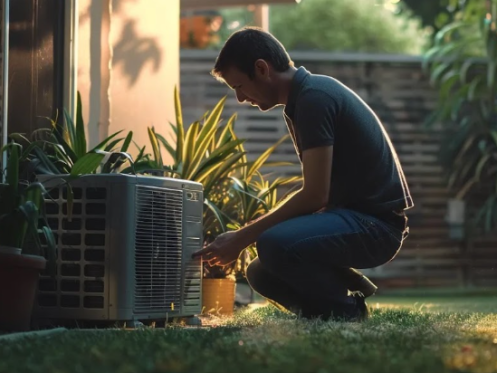As the seasons transition and temperatures swing from chilly winds to blistering heat, your home’s AC system responds dutifully, becoming your silent sentinel against discomfort. However, the constant battle against the elements inevitably leads to wear and tear. Given that an AC unit represents a significant investment, understanding its average life expectancy is crucial for planning future expenses and ensuring constant comfort. Regular encounters with a stubborn thermostat or rising heat challenges may hint at the need for attention. In this read, you’ll discover how to spot the right time for an upgrade, ways to prolong the efficient functioning of your system, and the impact of quality installation on your unit’s longevity.
The Average Lifespan of Home AC Systems
Seasoned HVAC professionals often cite a range of factors that play pivotal roles in determining the lifespan of home AC systems. Regular air conditioning maintenance stands out as a decisive influence, playing an integral part in not only keeping the AC running efficiently but also in potentially prolonging its functional years. Similarly, the choice of brand can lead to stark differences in longevity, with some brands known for designing home appliances that outlast their counterparts. Furthermore, integrating your AC with a properly serviced furnace mitigates the strain on the system, thereby contributing to its overall longevity. To assist homeowners in maximizing the life of their AC systems, key tips for upkeep and wise use will follow, ensuring the AC remains in peak condition for as long as possible.
Factors That Influence AC System Longevity
A well-maintained AC system is less likely to succumb to issues such as mold, which not only degrades air quality but can also cause considerable damage to system components, reducing the life span of the unit. Regular cleaning and replacing filters prevent mold from taking hold and ensure that the heating and cooling processes are not hindered by blockages or contamination.
Another determinant of HVAC life expectancy rests on how it’s integrated with the home’s heating system. An AC unit forced to function in tandem with an inefficient or failing heating system often experiences elevated levels of wear and tear. Owners looking to extend the life of an AC unit are advised to ensure the heating system operates at its peak, minimizing undue stress on the air conditioning machinery.
Tips for Extending Your AC’s Life
To protect the life expectancy of an AC unit, strategic scheduling of usage and careful monitoring of electricity consumption are essential. Keeping an eye on peak load hours and reducing the operational time during these periods can prevent overworking the system and maintain optimal efficiency.
Ensuring the condenser is free from debris and obstructions is another prudent step in safeguarding an HVAC‘s lifespan. Routine checks and clearing away leaves, dirt, or other materials that can impede airflow contribute significantly to the unit’s longevity and performance.
Signs Your AC System Needs Replacement
Discerning the appropriate moment for air conditioning replacement can be as straightforward as noting a steady rise in energy bills, which may suggest the unit is losing efficiency and, consequently, costing more to operate. A spike in utility costs, particularly during periods of stable weather and unchanged usage habits, often flags a decline in the system’s condition. If an air conditioning unit demands frequent repairs, this too can erode both its longevity and your budget. Given the complexity of present-day systems, which integrate components like advanced pumps and boilers designed to manage humidity and temperature, the decision to continue repairing or to replace should be made after careful consideration of these ongoing costs against the benefits of a new, more efficient system.
Increasing Energy Bills as a Warning Sign
A steady climb in energy costs can often signal that an AC unit is reaching the end of its lifespan. Issues like diminished efficiency due to clogged ducts or worn components mean your system has to work harder, consuming more energy to maintain your comfort.
If the introduction of debris has compromised the functionality of your AC system, its life expectancy can sharply decrease, causing a noticeable spike in utility bills. Implementing supplemental cooling methods such as ceiling fan installation may help alleviate some strain but won’t substitute for a faltering air conditioning unit.
Frequent Repairs and Their Costs
An air conditioning system nearing the end of its average lifespan often requires more frequent air conditioning repair; this uptick in maintenance can quickly become a financial drain. When components start failing, homeowners are faced with the decision to either endure escalating repair costs or invest in a new AC unit.
Incurring costs for issues such as leaks or water accumulation signals a decline in an AC system’s health. If these types of repairs become regular events, they can drastically shorten the average lifespan of an AC unit, leading to substantial expenses over time.
Annual Maintenance and Its Impact on Lifespan
Meticulous maintenance is the linchpin in safeguarding an air conditioner’s performance and extending the hvac system lifespan. Tasks such as inspecting the unit for signs of the air conditioner blowing warm air or strange noises bolster system health. Adhering to a disciplined regimen of upkeep, including duct cleaning and ensuring the seasonal energy efficiency ratio (SEER) stays within acceptable ranges, plays a vital role in staving off the need for air conditioner replacement. Professional servicing, too, is pivotal in preempting breakdowns, safeguarding against wear that could truncate the average life of an hvac system. Consistent attention to these vital aspects of AC care maintains function and efficiency, preventing untimely deterioration.
Essential Maintenance Tasks for Homeowners
Consistent replacement of the air filter is a simple yet effective task that prevents unnecessary wear and tear, thus safeguarding average AC lifespan. Homeowners should be attentive to any irregular noise during operation, as these sounds can indicate looming issues that may deteriorate indoor air quality and system endurance.
The preservation of indoor air quality heavily relies on frequent inspections for cleanliness and seamless airflow within the system. Proactive homeowners can mitigate gradual wear and detract from the average AC lifespan by addressing noise or disruptions swiftly before they escalate into more severe problems.
How Professional Servicing Can Prevent Breakdowns
Your climate directly affects your HVAC‘s health; extreme temperatures can push a system to its limits. Calling on professionals for regular service intercepts potential problems, like a broken air conditioner, before they become costly emergencies, thus keeping more money in your pocket by averting significant repairs.
Professional inspections often unearth hidden issues, such as leaks, which might go unnoticed until they cause serious damage. Maintaining a routine servicing schedule under certified technicians can also uphold the warranty of your AC system, providing peace of mind as well as economic benefits through prevention of premature breakdowns.
The Role of Installation Quality on AC Longevity
The initial phase of an AC system’s life—air conditioning installation—anchors its future performance and ac life expectancy. Opting for the correct size and type of air conditioner is fundamental to ensuring efficiency, avoiding unnecessary stress from a unit that’s too small or wasting energy with one that’s too large. Professional installation goes beyond mere placement and electrical connections; it encompasses meticulous attention to refrigerant levels, secure connections, and optimal ductwork configuration. A system that is professionally installed minimizes risks of dust accumulation and leakage, thereby streamlining operational costs and extending the period before a replacement becomes necessary.
Selecting the Right Size and Type of AC Unit
Attention to the size of an air conditioner during selection is critical; an undersized unit will lead to a continuously overworked compressor, shortening the system’s lifespan, while an oversized unit can result in short-cycling, inefficiency, and unnecessary strain on the system.
Proper air conditioner maintenance begins with the correct installation. Professionals must evaluate the living space to ensure the chosen unit matches the area’s cooling requirements, thus averting undue stress on the system that could precipitate future operational failures.
Importance of Professional Installation Practices
Professional installation of your AC system sets the stage for optimal operation and energy efficiency. Technicians with the right expertise ensure all components are calibrated to work harmoniously, reducing the potential for energy-wasting inefficiency and premature wear.
Skilled installers conduct thorough evaluations of your home’s layout and ventilation needs, implementing systems that are tailored to your specific environment. This personalized approach helps maintain the integrity of the AC system over time, warding off common issues that stem from improper setup.
Upgrading to More Efficient Models Over Time
As technology advances, AC manufacturers regularly introduce models with improved energy efficiency and enhanced features that can substantially reduce utility costs and provide better cooling performance. Investing in these modern systems can lead to substantial savings in the long run.
Older AC units often fall short of current energy standards, leading homeowners to face increased energy bills and frequent repairs. Transitioning to a newer model can drastically cut expenses while offering a more reliable cooling solution.
Efficient AC systems come equipped with features such as programmable thermostats and variable speed motors, enabling precise temperature control and reduced electricity consumption. These advancements contribute to longer operational life and lower environmental impact.
Homeowners contemplating an upgrade should consider the seasonal energy efficiency ratio (SEER) ratings to select an AC system that offers the best balance between initial investment and long-term savings. A higher SEER indicates greater efficiency and environmental friendliness.
Conclusion
Understanding the lifespan of home AC systems empowers homeowners to make informed decisions regarding maintenance and upgrades. Proper care, including regular cleaning and servicing, directly impacts the efficiency and longevity of these systems. Recognizing signs of wear, such as increased energy bills or frequent repairs, can prompt timely interventions to avoid costly breakdowns. Ultimately, an awareness of factors affecting AC lifespan helps homeowners maintain optimal comfort while managing long-term costs.
Take action today! Contact Dream Team Home Services for expert assistance with your AC system. Explore our comprehensive range of plumbing, electrical, heating, and cooling services to keep your home running efficiently and comfortably year-round. Schedule your service now and experience the Dream Team difference!



